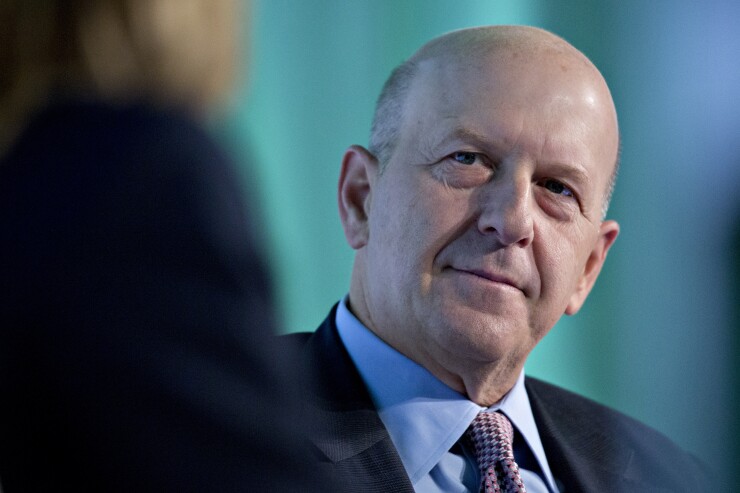Goldman Sachs is hoping that a busier 2024 in its bread-and-butter Wall Street businesses will restore its luster after a year that featured lots of strategic backtracking.
Last year, the New York megabank abandoned its ambitions to become a bank for everyone, rather than just for well-heeled customers, corporations and investment firms. The retreat continued in the fourth quarter, executives said Tuesday, explaining that they struck a deal to exit the Goldman Sachs-General Motors credit card program.
Goldman is focused on growing in the places "where we have a proven right to win," CEO David Solomon said on the company's fourth-quarter earnings call.
One such area is its asset and wealth management division, where revenues rose 23% during the fourth quarter compared with a year earlier. The revenue jump far outpaced analysts' expectations, and it was partly driven by an increase in assets under management and a related bump-up in management fees.
But Goldman's global banking and markets division — where the firm arranges mergers, bond deals and initial public offerings — had a less-than-stellar quarter. Net revenues fell 3% from a year earlier, partly due to a 12% slump in investment banking fees as merger activity stalled last year.
Solomon said Goldman executives are "seeing signs of potential resurgence" in M&A and capital markets activity, pointing to a backlog of deals. Investors have been hoping that lower interest rates this year could fuel a rebound in corporate M&A, which would help investment banks such as Goldman Sachs and Morgan Stanley after a down year in 2023.
"I'm encouraged by capital markets activity," Solomon said Tuesday. "I'm not going to say it's running back to 10-year averages right away, but it has materially improved."
The bank anticipates "more meaningful IPOs in 2024" and more activity in the debt and equity issuances that Goldman underwrites, Solomon said.
The bank's stock price was up 0.71% Tuesday after its earnings release. Meanwhile, rival Morgan Stanley saw its shares fall more than 4% after executives reported that softness in the company's wealth management margins could continue.
Analysts were upbeat about Goldman Sachs' performance, saying that revenues in its asset and wealth management division came in much higher than expected.
"We believe the results reinforce our view that the company is on track to continuing to grow share in banking and markets, reconfiguring the Asset & Wealth Management business to a fee-based model, and reducing losses in Platform Solutions," Saul Martinez, head of U.S. financials research at HSBC, wrote in a note to clients.
The Platform Solutions unit is Goldman's black eye, having racked up heavy losses over the last couple of years thanks to the bank's failed efforts to expand to consumer lending.
One prong of that strategy was Goldman's 2022 purchase of GreenSky, a home improvement loan platform that the bank ended up selling last year at a substantial loss.
Goldman is keeping its Marcus online deposit platform for consumers, which over the years has helped provide a much more stable source of cash than its pre-2008 model of short-term market funding.
But last year, Goldman announced that it would stop making personal loans under its Marcus brand. Earlier plans for a Marcus checking account were also scrapped.
Goldman's push to issue consumer credit cards has been harder to unwind, given the company's lengthy contracts with General Motors and Apple. Three months ago, Solomon said executives were focused on making the card partnerships profitable and "getting rid of the drag" they put on Goldman's earnings.
But on Tuesday, Solomon said that Goldman has struck a deal with General Motors to "transition their credit card program to another issuer," which it did not name.
Goldman also designated its existing GM loan balances as "held-for-sale" as it prepares to rid itself of that business. And it released some $160 million of reserves that it had stashed away in case cardholders didn't repay their balances — a figure that has dragged down Goldman's earnings before.
Solomon said Goldman had no updates on its Apple Card partnership, which has reportedly been a source of friction between the two companies and has also contributed to losses.
"We continue to work with Apple on our partnership with them to serve our customers and to continue to reduce the drag from the partnership, and we continue to make good progress," Solomon said. "And the drag in 2024 will be materially less."







